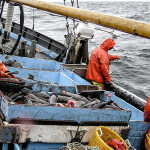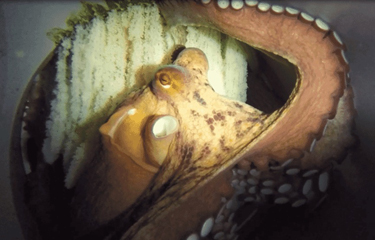Nueva Pescanova has submitted a plan to build the world’s first commercial octopus farm in Puerto Las Palmas, on the island of Gran Canaria, in Spain’s Canary Islands.
Nueva Pescanova has spent the past eight years working to develop a method of farming octopus, and recently announced its successful incubation, hatching, and raising of five generations of O. vulgaris octopus in a test facility. The company said it is now ready to commercialize the technology, proposing a EUR 50 million (USD 52.7 million) farm with an annual production capacity of 3,000 metric tons of octopus.
“The construction of an octopus farming plant in Las Palmas de Gran Canaria represents yet another step in the extensive and complex scientific challenge of guaranteeing a sustainable yield of the common octopus, a food in growing global demand for its extraordinary healthy and nutritional properties,” the company said in a press release.
Key to the company’s success in its efforts to farm octopus, which is solitary and territorial in the wild, has been research resulting in the design of a new system that allows the cephalopods to cohabitate in captivity. Nueva Pescanova’s EcoBiological Production System (EBPS), which the company is also using in its turbot production, is an “advanced zootechnical solution” that “applies the natural and specific conditions of the species in the wild to the productive culture.”
“These conditions allow the octopus to reduce movement by propulsion (associated mainly with a response of danger or flight from its multiple predators) and to prioritize its more-natural and -habitual movement through its arms, thus avoiding collision damage and significantly reducing the animal’s stress,” the company said.
Nueva Pescanova said it hopes to use its farming technology not just to feed the world’s large and growing appetite for octopus – approximately 350,000 metric tons (MT) of octopus are captured every year for human consumption – but to preserve and restore wild stocks of the species. The growth of octopus farming will reduce pressure on wild stocks, and the company hopes to release farm-born juvenile octopuses back into the wild.
“Our octopus aquaculture project is necessary to protect a species of great environmental and human value,” it said.
However, Nueva Pescanova’s octopus farm – first proposed in November 2021 – is opposed by environmental and anti-aquaculture groups, who have warned of potentially harmful ecological risks if the project is approved.
The Aquatic Animal Alliance (AA Alliance) is leading a coalition of more than 100 nonprofit organizations and scientists in opposition to the project. In a letter sent to the government of the Canary Islands in early May 2022, it provided a list of its top concerns, and requested the government deny Nueva Pescanova an environmental permit for the farm.
“Allowing this project to operate could result in serious biosecurity and biophysical risks with regard to effluents being produced from this facility and discharged to surrounding waterways,” AA Alliance Director Catalina Lopez said in the letter.
The organization said there is a lack of sufficient information in the permit application regarding potential effects on the marine ecosystem surrounding the proposed the farm. The use of live Artemia to feed the farm’s octopuses in their paralarvae stages is a discharge risk to surrounding waterways, the AA Alliance said.
“They have failed to conduct any relevant analyses or studies that examine the industrial biological interactions that are likely to occur as a result of large-scale production practices and have no safety nets in place to protect local ecological communities or public health,” Lopez said.
The AA Alliance said the farm also carries a potential for escapes of farm-raised animals into the surrounding ecosystem, leading to negative interactions with local fauna and the transmission of diseases that could affect wild octopus populations to local fishermen, which could “create a substantial public health crisis in Las Palmas de Gran Canaria.
Nueva Pescanova’s application states "in the case of the octopus, no relevant pathologies are yet known." But in its letter, the AA Alliance cited scientific studies showing octopuses suffered from up to 20 different diseases, including Vibrio cholerae, which causes cholera in humans. Antibiotics and antiparasitics used to treat any disease could contribute to the growing global crisis of antibiotic resistance, the group said.
Furthermore, the AA Alliance suggested the carnivorous diet required by the octopus relies on “unsustainable fishing practices, creating a larger strain on already scarce resources.”
However, in its proposal for the farm, Nueva Pescanova said it intends to develop its own octopus aquafeed using offcuts of fish from its shrimp and turbot farms and from its fleet of more than 60 fishing vessels. The company is also engaged in research into the use of alternative raw materials, including the protein-rich microalgae spirulina.
Photo courtesy of Nueva Pescanova







